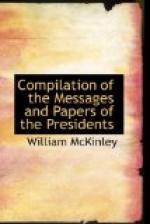The Pan-American Exposition at Buffalo has just closed. Both from the industrial and the artistic standpoint this Exposition has been in a high degree creditable and useful, not merely to Buffalo but to the United States. The terrible tragedy of the President’s assassination interfered materially with its being a financial success. The Exposition was peculiarly in harmony with the trend of our public policy, because it represented an effort to bring into closer touch all the peoples of the Western Hemisphere, and give them an increasing sense of unity. Such an effort was a genuine service to the entire American public.
The advancement of the highest interests of national science and learning and the custody of objects of art and of the valuable results of scientific expeditions conducted by the United States have been committed to the Smithsonian Institution. In furtherance of its declared purpose—for the “increase and diffusion of knowledge among men”—the Congress has from time to time given it other important functions. Such trusts have been executed by the Institution with notable fidelity. There should be no halt in the work of the Institution, in accordance with the plans which its Secretary has presented, for the preservation of the vanishing races of great North American animals in the National Zoological Park. The urgent needs of the National Museum are recommended to the favorable consideration of the Congress.
Perhaps the most characteristic educational movement of the past fifty years is that which has created the modern public library and developed it into broad and active service. There are now over five thousand public libraries in the United States, the product of this period. In addition to accumulating material, they are also striving by organization, by improvement in method, and by co-operation, to give greater efficiency to the material they hold, to make it more widely useful, and by avoidance of unnecessary duplication in process to reduce the cost of its administration.
In these efforts they naturally look for assistance to the Federal library, which, though still the Library of Congress, and so entitled, is the one national library of the United States. Already the largest single collection of books on the Western Hemisphere, and certain to increase more rapidly than any other through purchase, exchange, and the operation of the copyright law, this library has a unique opportunity to render to the libraries of this country—to American scholarship—service of the highest importance. It is housed in a building which is the largest and most magnificent yet erected for library uses. Resources are now being provided which will develop the collection properly, equip it with the apparatus and service necessary to its effective use, render its bibliographic work widely available, and enable it to become, not merely a center of research, but the chief factor in great co-operative efforts for the diffusion of knowledge and the advancement of learning.




